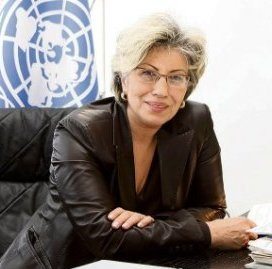Shahin Abbasov and Gayane Abrahamyan 5/11/09
While international mediators give an upbeat assessment to the May 8 tête-à -tête between Armenian President Serzh Sargsyan and Azerbaijani President Ilham Aliyev, within Azerbaijan and Armenia there is a scarcity of optimism.
Novruz Mammadov, head of the Azerbaijani presidential administration’s Foreign Policy Department, put it bluntly. “The [Minsk Group] co-chairs’ optimism does not correspond with reality,” Mammadov told ATV television on May 9. “The presidents’ meeting was unsuccessful.”
Azerbaijani Foreign Minister Elmar Mammadyarov had earlier asserted that the Armenians “again did not show a constructive approach.” He did not elaborate.
Yerevan cast the two leaders’ Prague meeting in somewhat of a more positive light. The talks with President Aliyev were “useful,” the Armenian presidential press service said in an official statement, since they “allowed the parties to further define approaches over the basic principles for the NK [Nagorno-Karabakh] conflict resolution, as well as to bring positions of the parties over some issues closer together.”
In a May 8 interview with RFE/RL’s Azeri-language service, US Deputy Assistant Secretary of State Matthew Bryza, the Minsk Group’s American co-chair, asserted that Aliyev and Sargsyan now agree on the major concepts for how to resolve the Karabakh conflict. Details will be sorted out “during the upcoming two weeks,” Bryza said. “After that the whole concept [of resolution] should be quickly agreed. It is realistic by autumn of this year.”
In a separate interview with the Ekho Moskvy radio station on May 11, Bryza had this to say (according to an unofficial translation): “In the end, the [occupied Azerbaijani] territories will be returned, and there will be, in addition, a return of Azerbaijani displaced persons to these territories.”
“At present, I can’t predict what will be [the case] with Karabakh itself,” Bryza continued. “We know that it will have some kind of new status. How that status is defined … well, negotiations are still going on about that.”
Armenian Foreign Ministry spokesperson Tigran Balaian, responding to Bryza’s Ekho Moskvy comments, said that “during the May 8 meeting in Prague, the issue of taking Armenian troops out of the disputed [occupied] territories was not discussed at all.”
In an interview with Russia’s Ekho Moskvy radio station, French Foreign Minister Bernard Kouchner stated that “each side follows its own line and responds to the scenarios in a very different manner.” He added, however, that “there is no need to be disappointed.”
One Azerbaijani analyst pinpoints a strategic reason for the mediators’ persistent optimism. “Turkey and the United States are hurrying to make progress on a Karabakh solution because they want to open the Armenian-Turkish border this year,” opined Elhan Shahinoglu, head of the Baku-based independent think-tank Atlas. [For background see the Eurasia Insight archive]. “It is clear now that Ankara will not be able to open the border by separating this issue from the Nagorno-Karabkah talks. So progress is urgently needed.”
The Prague talks took place against a background of unprecedented diplomatic activity. During the last month and a half, Turkey and Armenia agreed on a “road map” to reconciliation, presidents Aliyev and Sargsyan both paid visits to Moscow and US President Barack Obama visited Turkey, a key Azerbaijani ally.
The pronouncements about progress worry one former Armenian foreign minister. “There has always been a limit to the compromise the Armenian side could afford, so the sides could not reach agreements when the Azerbaijani position did not fit within the framework acceptable to the Armenian side,” Vartan Oskanian, who served as foreign minister from 1998 to 2008, told the Armenian news site Yot Or in a May 8 interview. “What is it now that makes it possible to talk about an agreement? Is it because Azerbaijan has lowered the benchmark for its demands, or is it Armenia?”
In Azerbaijan, ANS-TV quoted an unnamed government source as saying that Armenia had gotten tougher at the talks. Sargsyan, the source claimed, demanded that a date be set for a vote within Karabakh about the territory’s status in exchange for an Armenian withdrawal from five Azerbaijani regions bordering the territory. No mention of such a proposal has been made in Armenia.
Within Karabakh itself worries are growing that the territory’s fate will be decided without its de facto government having a say in the matter. “No one can decide [Karabakhis’] fate sitting there, in Yerevan,” asserted the region’s former de facto defense minister, Samvel Babaian, at a May 9 news conference. “The people in Karabakh will not obey any decision when they feel danger. I am confident of it.”
On May 9, President Sargsyan visited Karabakh, where he was born, and spoke with the region’s leader, Bako Sahakian. In remarks to reporters, Sahakian expressed confidence that Armenia is trying to have Karabakh included in the negotiations. Karabakh was represented in the talks until 1998. “[E]verybody realizes there can’t be any final decision without the Nagorno-Karabakh Republic’s participation,” Panorama.am reported Sahakian as saying.
But if Karabakh’s future status becomes the sticking point, the chances for a breakthrough would appear even slimmer, added one Baku observer. “Azerbaijan is not ready for any compromise on this issue,” independent analyst Rasim Agayev told ANS TV on May 8.
One Azerbaijani analyst argues that any future progress will depend on the results of revived dialogue between Russia and the United States. President Obama and Russian President Dmitry Medvedyev are scheduled to meet in July in Moscow. “If Moscow and Washington will agree on the wide spectrum of problems in US-Russian relations, I would expect a breakthrough at the Karabakh talks as early as the autumn,” commented Rauf Mirkadirov, political columnist for Baku’s Russian-language Zerkalo (Mirror) daily.
Still, getting a clear grasp on how the Prague meeting will affect further talks poses a challenge, noted one Armenian analyst. “One needs to be at least a fortune-teller to judge [the future] from Bryza’s words,” said independent political expert Suren Aivazian.
Editor’s Note: Shahin Abbasov is a freelance correspondent based in Baku. He is also a board member of the Open Society Institute-Azerbaijan. Gayane Abrahamyan is a reporter for ArmeniaNow.com in Yerevan.






